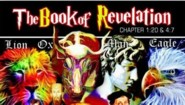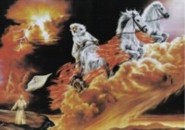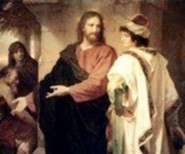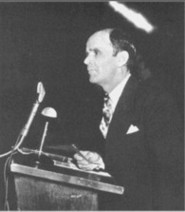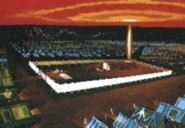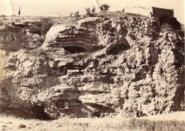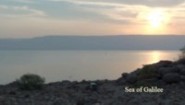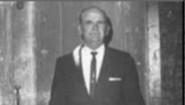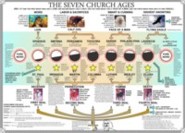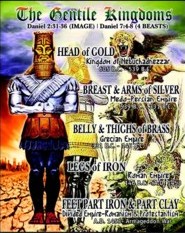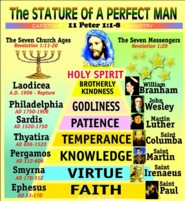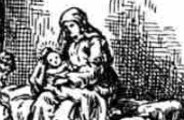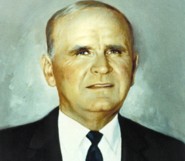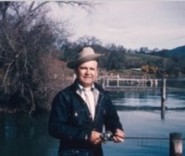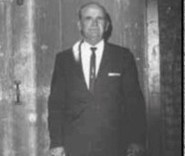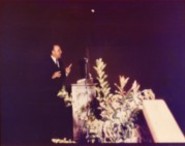A Paradox.
<< prev
next >>
Incredible, but it's true.
William Branham.Read the full account in...
A Paradox.Now, the subject this afternoon: "A Paradox."Now, the word "paradox," as I have just been looking it up and be sure that-- that I was right; the word "paradox" means, according to Webster, that "it's something incredible, but it's true." Now, you know, we've heard the old saying, that-- that, "Truth is more (What do they call that?)-- more strange than fiction," truth is. Because when a person tells the truth, sometimes it's very strange.
-----
Joshua here is a Book; actually it's a Book of redemption, of the Old Testament. Joshua, we would have to consider it to be that, the Book of redemption. Because it's... Redemption has two parts. Redemption anywhere has two parts. That is, it's "out of" and "into." It takes two parts to make redemption, "out of," "into." Moses represented the law which brought them out of Egypt, and whereas, Joshua represented grace that took them into the promised land. Another way was, the-- the law and grace were two different aspects of God's command. Now, the law brought them out, Moses, and Joshua took them in. It also represents something for our day. Now, it represents, as they were in the journey, coming from--from Egypt into a promised land, so have we come out of a world of Egypt, chaos, on our road to a promised land. "In My Father's house are many mansions; if it wasn't so, I would've told you," John 14: coming "out of," going "into."It's law that brings us to recognize we're wrong, but it's grace that forgives us. The law has no hope of--of redemption, because that... And to complete it... It has no grace in it, because law only points that you are a sinner, but grace tells you how to get out of it. Law is the policeman that put you in jail, but redemption is the One Who come paid your fine; and "out of," and "into," into grace.The Ephesus... Now, we find the same thing, the Old Testament... I think this Book of Joshua fits. A fitting word for it would be the Book of Ephesus of the Old Testament. The Book of Ephesians of the Old Testament, would be a good thing to title this Book of Joshua, because it's certainly fitting to this.
Now, we find Joshua representing grace, or some propitiation, that it could not exist in the same time that law was in existence.Neither does any message, that forwards the people on, ever coincide with a past message. It will not do it. That's where you have trouble today. Jesus said, "Does any person take a-- a new piece of garment and put it into an old, or put the new wine into old bottles? They perish. It bursts them open." They can't stand it. And Joshua could not at all become into his ministry until after Moses was gone. So you see the very first verse here, "Moses My servant is dead; now arise and take this people to the promised land." Moses, representing the law, had served its time. It's-- the law had served its time.
They started out, really, with grace to begin with. Before they had law, they had grace. While they were in Egypt, without law; no one down there, was just the priests, and so forth, but they didn't have any law. The law had not yet been given. Grace provided them a prophet. And, also, grace provided an atonement, the sacrificial lamb. We're getting into that this week on the sacrifice, the blood, because there lays your healing. So on... The atonement had been provided before there was any law. Grace was before law, during law, and after law.So there was Joshua, representing grace, was right along with law, but could not be enforced as long as law was in its proper place. And so has the church world in this last day. It's come along, it's played its part, but there's coming a time where it must cease. It must do it. There's got to be an Ephesians also of this journey, just as there was of other journeys. There has to come an Ephesians, an Ephesus, an Ephesian of this journey. Watch. Wherein that law could never save a sinner, as I pointed out. It could not. Therefore the promised land represented a day of grace. See, he could not take them in, into that journey.
And if you noticed, in that journey, they had three stages of their journey. First was the preparation by faith down in Egypt, under the sacrificial lamb. Then they crossed the Red Sea, into the-- the wilderness of separation, which represented another stage of the journey.'Cause under the preparation, when they all got ready, then when they come to the-- to the Red Sea, there was a failure again. The people did not believe, after seeing many things that God had did. They still did not believe. And God opened up the Red Sea and took them forth, which we're taught that all the people were baptized unto Moses under the Cloud and the sea.
Now, they were baptized, repented and were baptized, and come out to walk in a new life, in a new land, in a new journey, amongst new people, and the hand of God upon them. But it finally come to a place in this walk that they had, that they was not satisfied with their walk of grace. They had to come to something that they could do themselves.Now, that's where people think today of Divine healing, or some any other work of grace of God, that there's something that you have to do. You, there's nothing you have to do but believe, just believe God. And they, if they would've continued on... The promise wasn't given them under the law. The promise was given before the law, without any conditions to it, "I have given you this land; go on over into it." But before they got to that promise, they decided there was something they must do themselves. And, that, we still find that among human beings. We're prone to be that way, "There's something we've got to do." We feel that, that we've got to have something into it also. You do have something into it; that's your surrender of your own will, your own ideas to the will and idea of Almighty God, and it's finished. That's all there is. Just take His promise, don't think of nothing else. Walk by it, and God does the rest of it.
Then they wanted a law. And God always gives you the desire of your heart; He promised to. But we find out, when they turned one step from the side of what God originally promised them, then that was a thorn in the flesh until the law was taken away, until Jesus Christ came and was crucified to take away the law. It was a thorn in the flesh. And anything that you try to do within yourself, it'll always work to your dishonor. It'll work to your disadvantage. Just simply believe God, and that settles it. What God promised, "I'm the Lord Thy God Who heals all thy diseases. (See?) If there's any among you sick, let them call the elders of the church." He promised the works that He did, would be done in His church.
Why do we have to accept organizations, and so forth, that'll write that off of the Book? See, it-- it becomes a thorn in the flesh. And here at the end time, we meet the thing again, face to face; it's up to the Methodists, Baptists, Presbyterians, and whatmore. See? You-- you can't go on; you've got to come back to the entire full Gospel. It was made for the full man by a complete God Who was made flesh and dwelled among us. And we know that those things are true.
Now, if we notice then, their journey in the wilderness is where they got their greatest mistake that Israel ever made until Calvary, was when (in the Exodus 19) they accepted law instead of grace. They had grace. They had a prophet. They had-- they had a sacrificial lamb. They had redemption. They had been brought through the Red Sea. They'd been healed of their diseases. They had had water from a smitten rock. They'd-- they'd manna out of heaven. Everything they had need of had been supplied and still they wanted something else.Now, that's a perfect type of our Ephesians today, exactly. We come out under Luther; we went through sanctification under Methodist; and came into the restoration under Pentecost, exactly like it was, the wilderness journey. When God brought us out, we did very well. But what did we do? Wanted to be like the rest of them. Now, we find out that grace is the only thing that takes us through, never law.
Joshua here is a type of the last day ministry. See? Now, remember those three stages of the journey. All of it ceased, first the law and everything had to cease, so that Joshua... And Joshua is the same word as Jesus, "Jehovah-Saviour," that took them from their wilderness into the promised land. Now, I know many hold... And I don't want to disagree with the scholars, but many hold that the promised land represents heaven. It could not represent heaven. It could not, because they had wars, and troubles, and flusterations, and everything in the promised land. It does not represent the promised land.
But you notice, just before they entered the promised land, all of the-- the differences that-- that had rose up among them. They... One of the great things was Korah. He didn't want this one man leadership. Dathan, and how they come up before Moses and tried to tell him that "the-- the message had to mean this," and put a different interpretation to it, their own ideas of what it was. And they every one perished, every one.Jesus said, "There wasn't none of them but what perished." They said, "Our fathers eat manna in the wilderness for the space of forty years," Saint John 6. Jesus said, "And they are every one dead." "Dead" means "eternally separated." They're all dead, yet they enjoyed hearing the message, yet they enjoyed the manna that fell. Not another manna, the genuine manna.
-----
Now, we're taught in Revelation the 6th chapter, I believe, yeah, 6th chapter, of the Seven Seals. That's supposed... The Book to be sealed up with seven mysteries, or Seven Seals, Revelations 6. And in the last day, Revelations 10, in Revelations 10, we find out that the Laodicea, last messenger of the last age, in the-- during the time of his prophecy, that the Seven Seals would be opened, the seven mysteries, sevenfold mysteries that had been left off.In every age there'd been some of it left off. The reformer didn't have time to take care of it. In the days of Luther, he only preached justification by faith. He was gone, they made a church. After that come Wesley, he preached sanctification. There it was. And along come the Pentecostals.But we're promised, according to Revelations 10, and according to Malachi 4, and Saint Luke 22:17, and so forth, that there is got to come a-- an Ephesians to this. There is promised it, friends. There must come an Ephesians, that these sevenfold mysteries of the Word of God must be unfolded. And it's in the Laodicean age that this takes place. I believe that we're-- we're there. I believe we're right in the shadows of the coming of the Son of God. And as Joshua, just before the Ephesians raised up, so did John the Baptist raise up just before the next Ephesians. And we're promised another, another Ephesians. It's predicted here in the Scripture; therefore, I think that we are living in the Ephesians again. Back again to... We are promised that what was left off during those seven ages...
Now, you cannot add nothing to the Book or take nothing from It. Revelation 22:18 says so, "Whoever will add one Word, or take one Word, his part will be taken from the Book of Life." Now, we cannot add or take.So therefore, we know that Luther could not get to it; Wesley, and so forth, the reformers, Knox, Finney, Calvin, on down, so forth, they didn't get it all, but what they had was the Gospel truth. But now in the last days, we are given the understanding by the Word, that we are going to understand it, because it'll come an Ephesian age to it. And we're here. Now, paradox... I'll leave that hang, because I just got about ten more minutes and then we'll have the prayer line. Paradox...
Read the full account in... A Paradox.
Click on an image to download PDFs or fullsize picture.
 Acts of the Prophet (PDFs English) |

God, Hidden and Revealed in simplicity. (PDF English) |

Message Hub...Choose your Language and download Free Messages from Brother Branham




